Disclaimer: This article was enhanced by AI for entertainment purposes
Every day, we pass them. The tired eyes. The worn coats. The hands that once held dreams now outstretched for mercy. We move on, coffee in hand, appointments on the calendar, never stopping to ask—who were they before the world stopped seeing them? We assume. We judge. We look away. But what if one of those invisible souls wasn’t who you thought? It all began the moment a ragged old man stepped through the doors of a luxury restaurant… and the world revealed itself. Would you feed a stranger if no one was watching?
A Day Unlike Yours

Don Davidson awoke with no roof, no warmth, no scent of coffee. Only a growling stomach and a torn coat greeted him under the chill of dawn.
His days didn’t start with choice, but survival. While others stirred cream into mugs, he stirred courage to beg for scraps, roaming alleys hoping for mercy.
On that particular day in Naples, Florida, something pulled him toward a golden-windowed palace of indulgence—one of the city’s most luxurious restaurants. Hunger clouded his fear. He stepped forward. The guests inside were not ready for his presence.
Faces Behind the Glass

He stood outside the glass, gazing at lamb racks, wine flutes, and laughter echoing inside. Steam curled against the windows, mocking him with invisible fingers.
Diners spotted him staring. Forks paused mid-air. Unease spread table to table. A waiter whispered to the manager. The outsider had become their dinner distraction.
Drawn by aroma and hunger, Don edged closer, heart thumping. The door was unattended. One step. Then another. The rich warmth hit him like a tidal wave. Then, eyes turned. Silence fell. Judgment awaited.
Unwanted Attention

He shuffled past velvet chairs, eyes on no one, yet feeling every stare. Murmurs began. A mother clutched her child’s hand tighter, eyebrows raised in disgust.
The manager appeared, suited and stiff. His eyes scanned the room, zeroed in on the frail man disrupting his precious ambiance. His jaw clenched.
“What are you doing here?” he asked, lips taut with contempt. Don clasped his hands, voice trembling. “I just need food. Even a slice of bread, sir.” But mercy was not on their menu.
The Outburst

The manager’s silence gave Don a glimmer of hope. But then, the man’s voice rose. “You think this is a shelter? Get out before I call security!”
Guests watched as if it were theater. Don didn’t flinch. “Please… I mean no harm. I’m starving. Just one piece, sir, that’s all I ask.”
Fists clenched, nostrils flared—the manager stepped forward. “You want bread? Get a job. Wash that filth off. You don’t belong where people work for what they eat.” Don was pushed out. He felt weak and defeated, but the journey wasn’t over.
A Second Chance Denied

Don wandered to another branch of the same luxury chain. Maybe this one would be kinder. He knew the brand—he used to dine here long ago.
Outside, he pleaded with the waitress. “Please, I used to be a regular… I lost everything.” She sneered. “Sure, grandpa. You and every other liar.”
She summoned the chef, who crossed his arms. Don repeated his plea. The chef laughed, then snarled, “Try the trash out back.” His words sliced deeper than hunger. And yet, Don didn’t walk away just yet. What if there’s a little bit of kindness in their hearts?
The Dumpster Suggestion

Don stood frozen, shamed, but still hoping someone—anyone—might help. “I’m not crazy,” he murmured. “I used to have money. I swear. Just… please.”
The manager emerged. “If you want food, go dig in our dumpster.” He laughed. Staff around him chuckled too. No one stopped to consider the cruelty.
Don turned away, his heart heavier than his empty stomach. The streets swallowed him again. But a name surfaced in his thoughts—someone from the past. Someone who might just remember him?
A Familiar Name

As twilight crept in, Don’s mind drifted to Carlos—the head chef at another branch. Not just a colleague once, but a dear friend through life’s brightest days.
He happened to be the right-hand man of the owner of these restaurant chains and would be the next in line to get the restaurants in his name after the owner’s death.
A spark of hope rekindled in Don’s chest. He shuffled toward the branch with the weary gait of a man betting on his last chance. Each step whispered, “Carlos will help. He has always been kind to people like me.”
The Cold Kitchen

This restaurant wasn’t too far from the one he was at currently, so he started walking towards it. It was grander than the last. Carlos stood in the open kitchen, barking orders. Don called softly, “Carlos… please…” But the chef didn’t even look up.
Carlos waved him off. “Not now. We’re busy. This isn’t a soup kitchen.” His words landed like bricks, crushing every ounce of hope Don carried.
Don tried again. “It’s me—Don. I’m starving. Just one slice of bread.” Carlos finally looked, frowned, and sneered, “I don’t know any beggars named Don.” The insult cut deeper than hunger ever had.
A Mockery of the Past
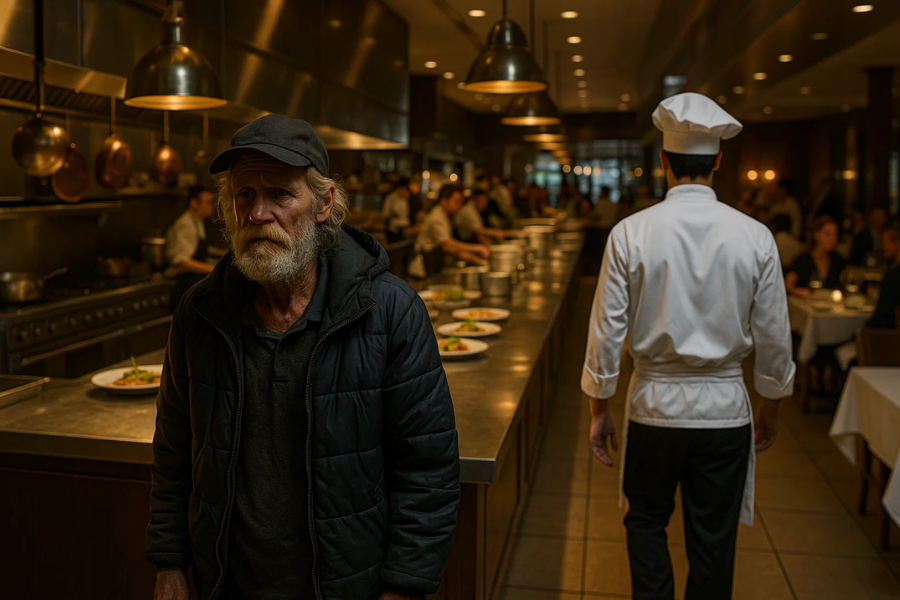
Don’s voice cracked. “I’m not a beggar… I was once a customer. I used to own suits, too. You knew me, Carlos. You knew me.”
Carlos laughed bitterly. “Right. You were rich? Then what happened? Bad poker night? Get out of here before I make an example of you.”
“I have no one,” Don whispered. Carlos leaned in close. “Then feast on regret. I only feed people who matter.” And with that, Carlos turned his back.
Words That Stung
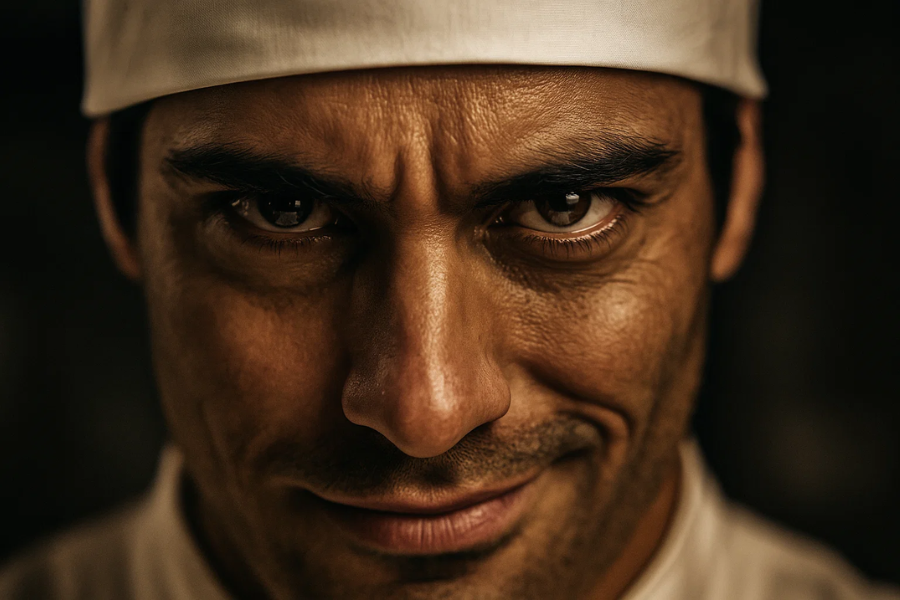
Don tried to explain himself to Carlos, saying that everyone else had already turned him away and all he wanted was a piece of bread to survive.
Carlos chuckled and replied that those people were right to do so. He told Don to stop begging and go find a job instead. In his eyes, the man deserved to be rejected, viewing him as either dangerous or delusional.
Carlos smirked. “You think people like us get anywhere by feeding the weak? The man who owns this chain is dying anyway. Soon it’ll all be mine.”
The Great Pretender

Carlos only pretended to be the owner’s closest friend and right-hand man for the sake of money—nothing more. Why would someone like him ever pity a homeless man?
Don stood frozen in disbelief, unable to find the words. Before Carlos could utter another word, he turned and bolted from the restaurant. Emotion surged through him, and tears broke free.
But Don didn’t give up. He visited every branch of the restaurant chain, clinging to a shred of hope—only to be met with the same cold indifference each time. Time’s ticking for Don. He’s getting so much weaker.
One Last Branch

Night fell. Streetlights flickered above Don’s shoulders. He dragged his feet toward the last branch—the only place he hadn’t yet pleaded for a bite to eat.
This was the elite one, where limousines lined the curb. Surely, he thought, if rich hearts ever felt kindness, it would be here—or nowhere.
As he neared the entrance, the unexpected happened. The security guard stepped forward—not to block, but to smile. “Sir… are you okay?” For the first time that day, someone saw him.
The Unexpected Kindness

Don hesitated. “I haven’t eaten in days… I’m not here to cause trouble.” The guard’s eyes softened. “Wait here. Let me check with the manager.”
He disappeared behind double doors, leaving Don blinking under the soft lantern glow. Could this be real? Could hope knock again where doubt had taken root?
Minutes passed. Then the manager arrived—not with rage, but with a warm smile. “Sir, how can we help you tonight?” Don’s breath caught. Could kindness still exist?
A Table Promised

Don explained everything—the hunger, the rejection, the silence from every other branch. The manager nodded with compassion. “You’ve waited long enough. Let’s find you a table.”
Tears welled in Don’s eyes. Even if this ended in scraps, the respect alone filled him more than food ever could. He bowed his head.
The manager touched his shoulder gently. “We’ll prepare something special. Please, wait a moment.” Don stood outside, still disbelieving, watching through the glass with cautious hope. But the minutes turned into hours.
Waiting on Dignity
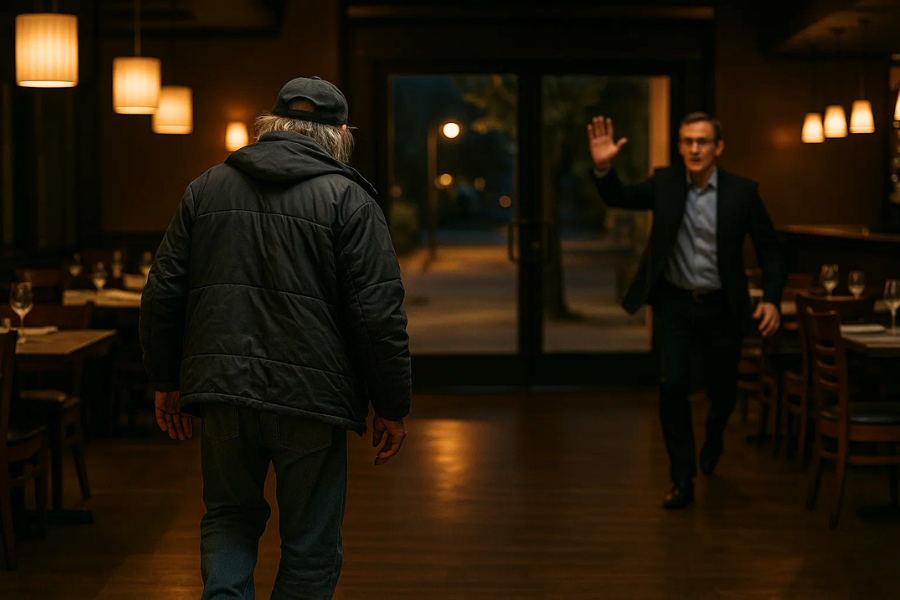
One hour passed. Then another. The restaurant slowly emptied. Don remained by the door, stiff from standing. A waiter walked past, avoiding his eyes.
He realized the truth. They weren’t preparing a meal—they were preparing to forget him. Like the others. His shoulders slumped as he turned to leave.
Then—footsteps behind him. A voice called out, “Sir! Wait!” It was the manager, jogging toward him, breathless, waving his hand. Don turned back, afraid to hope again.
Royalty at the Table
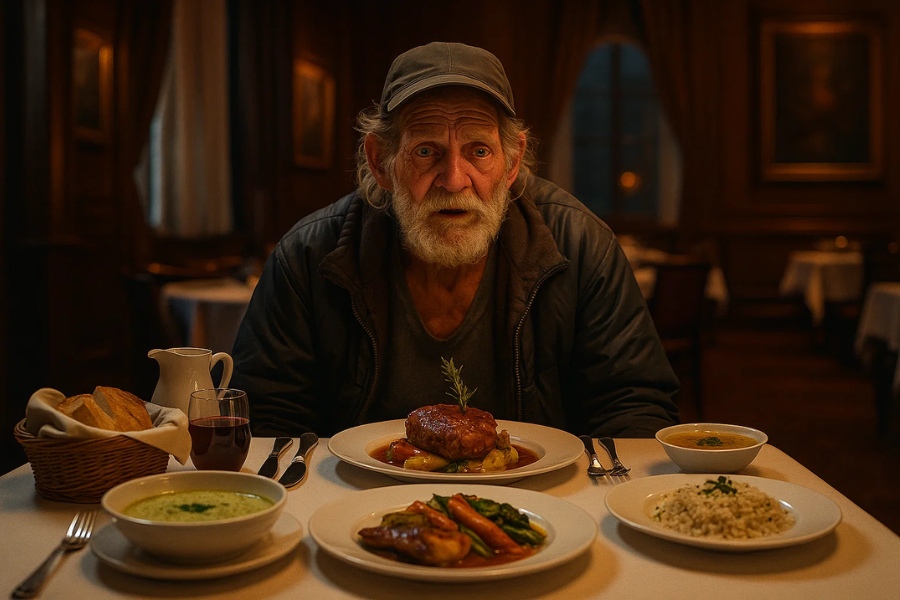
“I’m so sorry,” the manager gasped. “We didn’t forget. The kitchen’s just been busy. Your meal is ready.” He ushered Don inside gently.
The moment Don crossed the threshold, his eyes widened. A table had been set just for him—covered in fine linen, silver cutlery, a feast for kings.
There were five dishes, a pitcher of wine, and warm bread that smelled like childhood. Don’s lip trembled as he took a seat in silence. But the true surprise was yet to be revealed.
A Story Shared
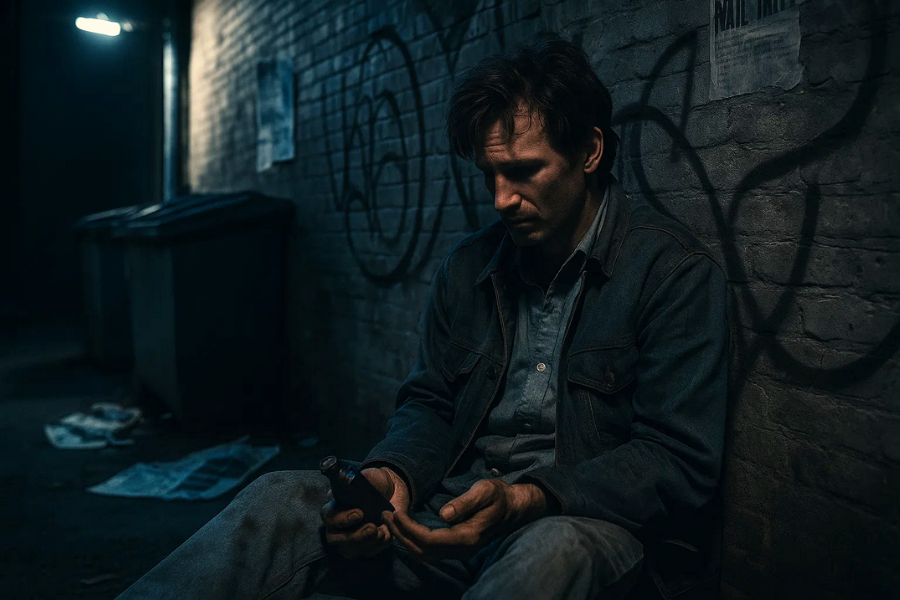
The manager sat beside him as staff delivered each course with grace. “I know what it feels like to be lost,” he said. “I was once like you.”
He recounted his past—a life shattered by tragedy, a spiral into addiction, the streets, the loss of his wife. Until one man gave him a chance.
“That man was the owner of this chain. He saved me,” he whispered. “And tonight, I just repaid a small piece of that debt.” Don’s heart swelled—but the real reckoning was still coming.
A Silent Feast
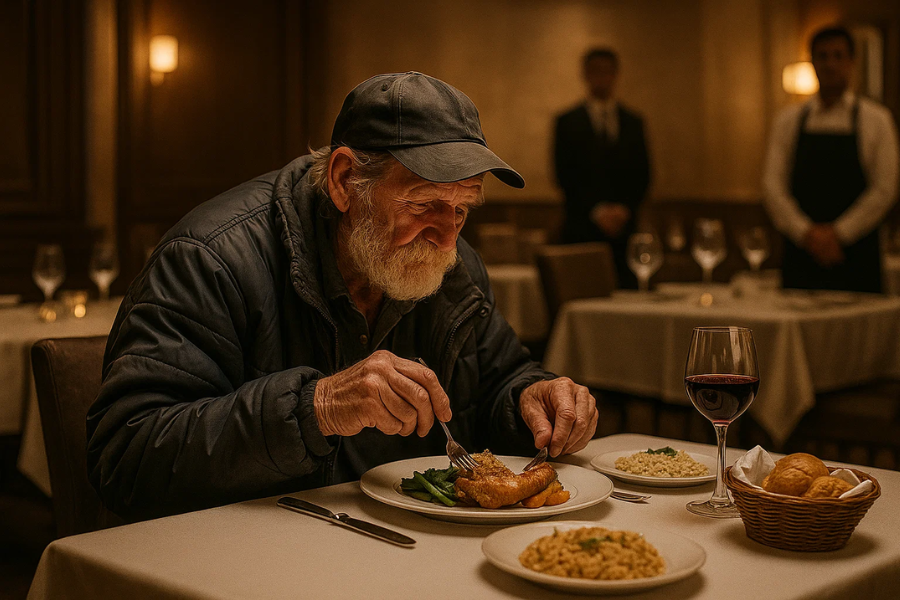
Don ate slowly, savoring every bite as though it were sacred. The manager stepped away, letting him enjoy the moment, watched quietly by respectful, attentive staff.
Each dish was served with reverence—roast chicken, herbed rice, baked vegetables, and warm bread with golden crusts. It felt like dining inside a dream.
For the first time in days, he felt seen—not pitied, not scorned, but truly honored. But deep within, questions stirred like embers waiting for fire. Why had this branch treated him so differently?
A Gift to Go
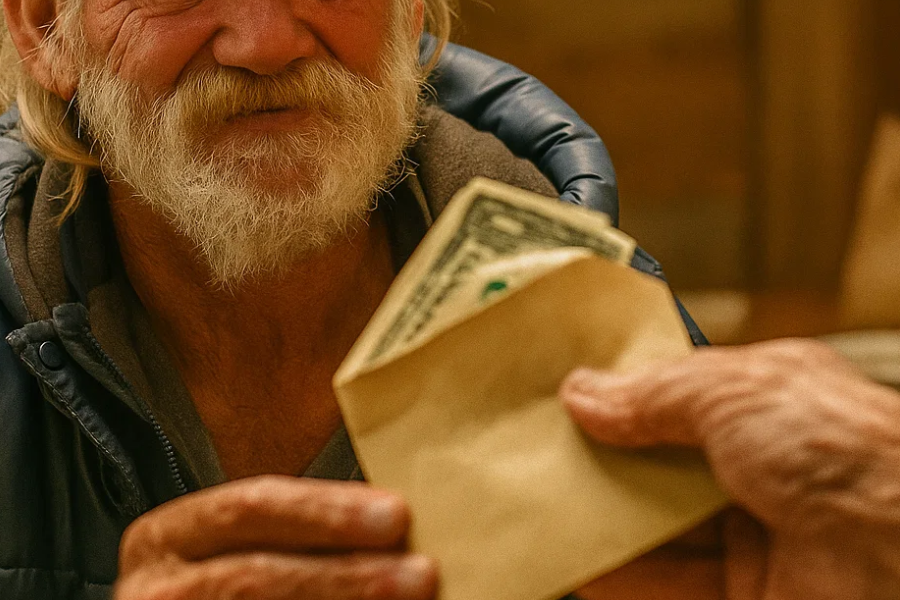
Once the plates were cleared, the staff returned—not to remove him, but to thank him. One placed an envelope in his hand. Another passed him a food bag.
The envelope held crisp bills, pooled together by the employees. The bag contained enough food for another full day—maybe two. It was more than sustenance.
“Come back tomorrow,” the manager said warmly. “We’d be glad to have you join the team here—if you’re willing to work.” Don was speechless. Is he going to accept it? Or will he choose to ask for a piece of bread forever?
The Summoning
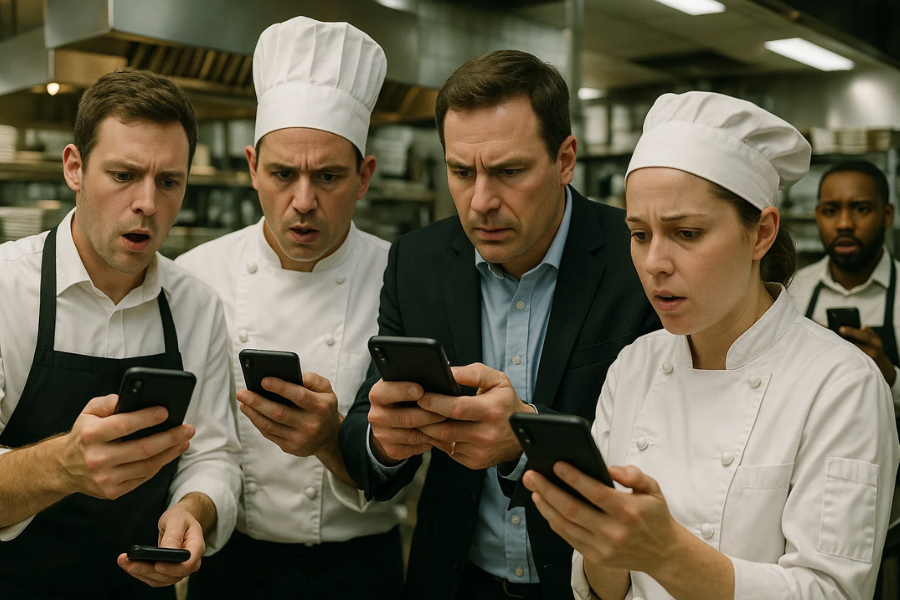
That next day, a message was sent across all branches. The owner of the restaurant chain was planning a surprise visit to one of the locations.
Every employee, from chefs to waiters, was ordered to gather in one place. Managers frantically cleaned silverware, polished glasses, and instructed their teams to be on their best behavior.
Don was still near the main branch when the commotion began. He walked by slowly, unnoticed—until familiar voices shouted angrily in his direction.
History Repeats
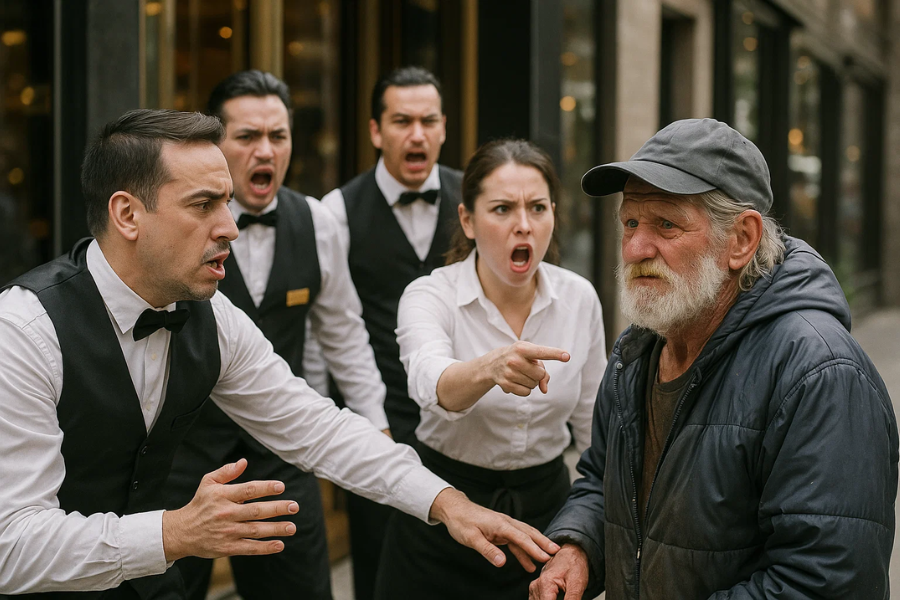
“Get away from here!” a waitress snapped. “Don’t you dare ruin this day!” Another waiter shoved him aside. “We’re expecting someone important.” Don stood, stunned and silent.
But the main street manager stepped out and waved him in. “Come quickly. Through the kitchen. Wait there until I call you.” He led him inside.
Don disappeared through swinging doors, vanishing from view. Staff shook their heads in disgust. “Why did he let that old man in? He’ll get us all fired.”
The Reveal
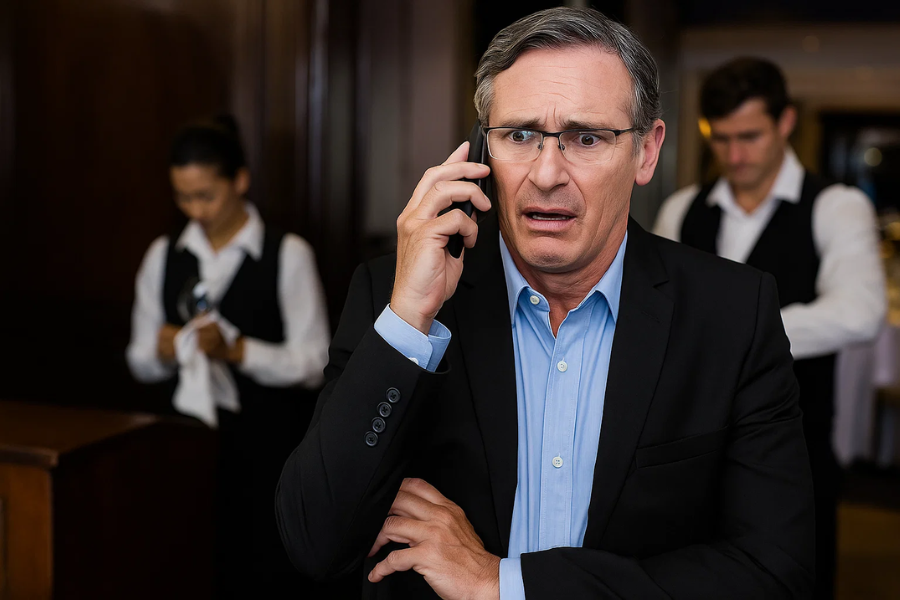
The owner never entered through the front. Managers checked their watches nervously. A call came through—answered by the very manager who had honored Don the night before.
“Yes, sir. Everyone’s here.” A pause. Then his face changed. “You’re… already inside?” He turned pale. “Where, sir?” The voice replied calmly: “In your kitchen.”
The manager rushed toward the back—and there stood Don, freshened up, hair combed, clothes neat. Every staff member stared in disbelief. Their mouths fell open.
Judgment in the Kitchen
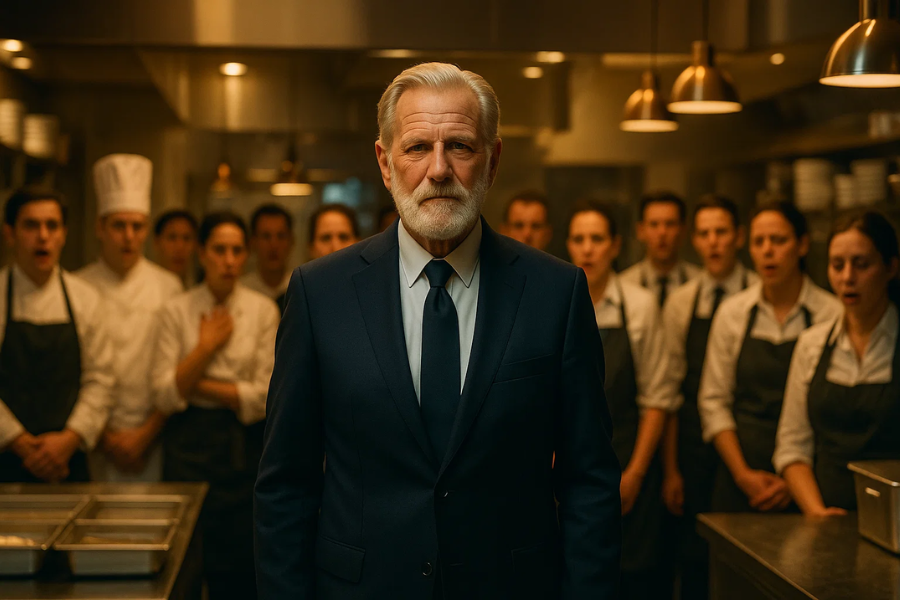
The homeless man… was the owner himself. Every face turned pale as Don stood tall in the kitchen, no longer hunched by hunger. They had all turned him away, and now they could barely speak.
He looked each one in the eye—waiters, chefs, managers. Their shame soaked the silence. None had known the man they mocked held the keys to their futures.
“I visited every branch,” Don said quietly. “Disguised. Hungry. Human. And almost none of you showed kindness. Not one slice of bread.”
The True Test
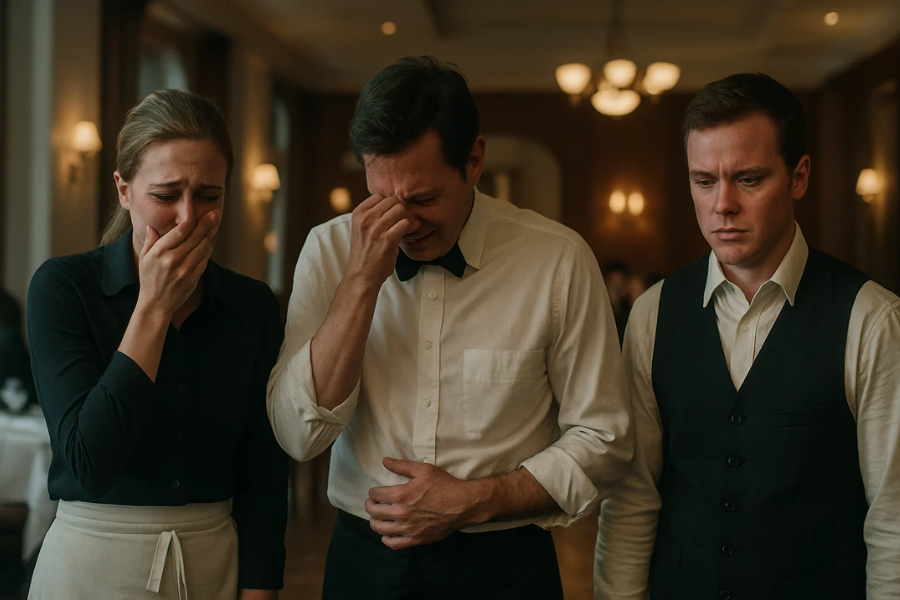
Don walked to the center of the restaurant, now filled with tense silence. “I didn’t come to check your uniforms. I came to check your hearts.”
“I built this chain not just on food, but values—compassion, respect, dignity.” He paused. “And now I see what remains when I’m not watching.”
Gasps filled the air. Tears began to fall. Some tried to step forward, stammering apologies. But Don raised a hand to stop them. The time for excuses was over.
Betrayal Revealed
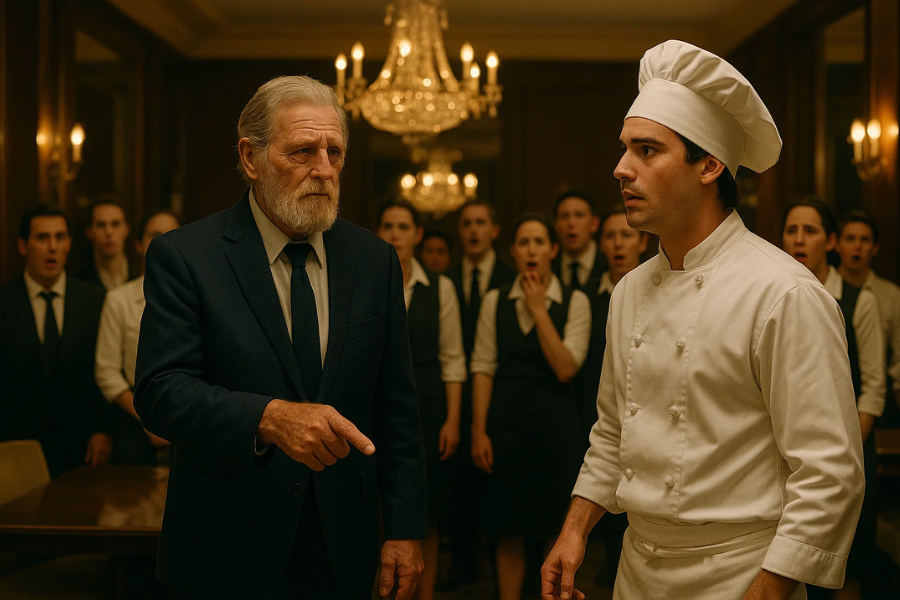
He turned toward Carlos, who had just arrived, smirking confidently—until he saw Don standing in full view. The smirk vanished like smoke in wind.
“You,” Don said slowly, “were my right hand. My trusted friend. You spoke of me as if I were dead. You laughed at suffering.”
Carlos tried to protest. “It was… a misunderstanding—” but Don cut him off. “No. It was the truth spoken when you thought I was powerless.” Carlos was mortified. He had nowhere left to hide.
A New Heir

Don took a deep breath. “I don’t have long to live. I have cancer. And I have no family. My restaurants, my legacy—they need a soul to carry them forward.”
Eyes turned toward him, some hopeful, most dreading. Don pointed toward the main street manager—the one who had fed him, seated him, listened to him.
“You are the one I choose. Not because of business, but because of heart. This empire will be yours.” The room gasped in stunned disbelief. Would a punishment follow?
Mercy Over Judgment

Don turned to the staff, eyes wet but voice steady. “Those who turned me away—you failed not me, but yourselves. Yet… I won’t carry more bitterness.”
Some fell silent, stunned. Others wept, expecting wrath. But Don continued, “I will not fire you. Instead, I ask for change. Real change—from the inside out.”
“I was hurt. Deeply. But I still believe people can grow.” His voice trembled. “Don’t prove me wrong again. Show me you can be better.”
A Family Reclaimed

Don took a step back and looked at them—not as workers, but as the closest thing to a family he had. Silence wrapped the room in reverence.
“You were my family,” he said softly. “Some of you forgot what that meant. But even broken families can heal—if they choose to.”
Staff members stepped forward, ashamed yet moved. One whispered, “We’ll do better, sir.” Another bowed low. “Thank you… for seeing us. Even when we failed to see you.” Don’s eyes welled. He’s getting the team on a new mission.
Fresh Start

Don gathered the team—the ones who passed his silent test, and even those who failed but showed regret. “From this day on, things will change.”
“This business won’t just serve dishes,” he continued. “It will serve dignity. Every location will keep a table open for someone who cannot pay.”
The staff nodded, stunned. “We are not just in the food business. We’re in the humanity business,” Don declared. “And kindness will be our signature dish.” Is the path to kindness really that easy?
An Empire of Good
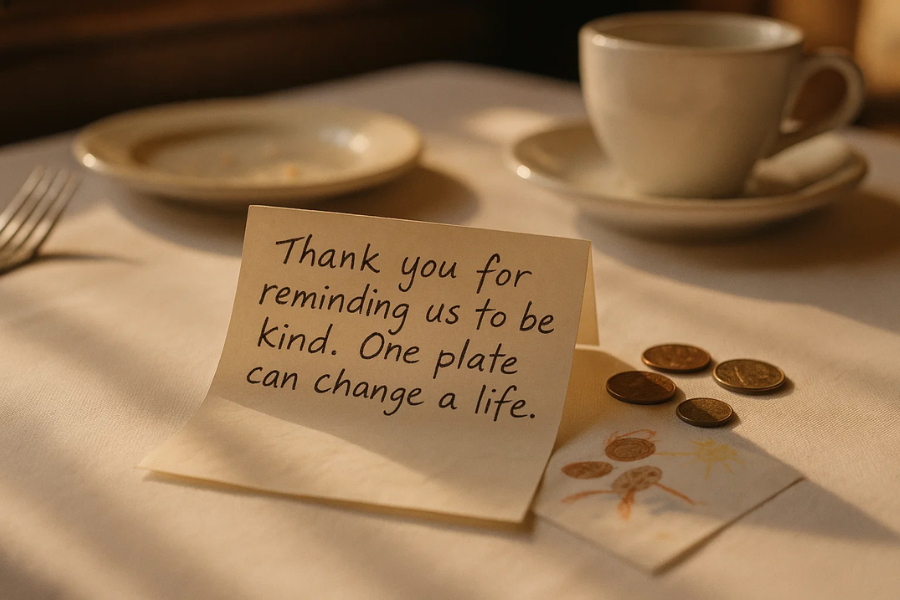
News of Don’s act spread across the city. Journalists arrived. Videos of the restaurant’s transformation went viral. People flocked to support a place now known for its heart.
Customers left notes of thanks. Children donated coins. Locals stood outside, just to catch a glimpse of the man who had disguised himself to see the truth.
Don, frail but smiling, sat by the window each day—welcoming guests, training staff, and reminding them: one plate can change a person’s whole world. But his time was drawing near.
The Final Gift

One evening, Don called the new heir to his side. “This chain is yours now—not just in name, but in soul. Promise me it will never lose its heart.”
“I promise,” the manager said, holding back tears. Don nodded. “Remember—feed the stomach, yes. But feed the spirit more.” He handed him a worn notebook.
It held sketches, journal entries, and letters to staff he never sent. “Everything I couldn’t say, I wrote here.” Don smiled. “Now it’s yours.” And with that, Don closed his eyes…
The Quiet Goodbye
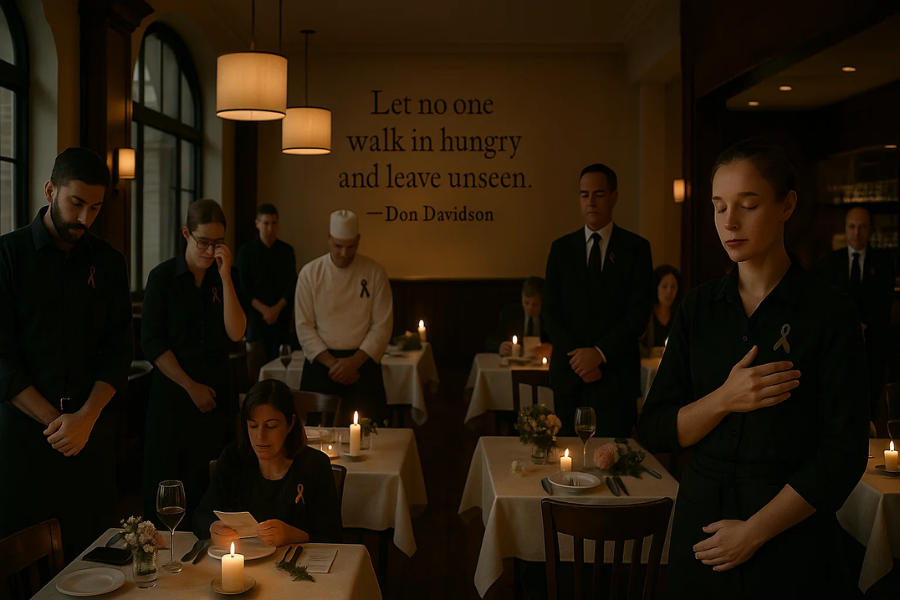
Don passed peacefully that night—his last breath soft, his heart finally full. He died not alone, but surrounded by the family he had forgiven and rebuilt.
The next morning, candles flickered on every table. Staff wore black ribbons, and customers bowed in silence. Flowers poured in from strangers across the world.
Above every entrance, a golden plaque was mounted: “Let no one walk in hungry and leave unseen. —Don Davidson.” His name etched forever, not in gold—but in gratitude. And so began a new chapter. But where’s Carlos?
A Chain Transformed
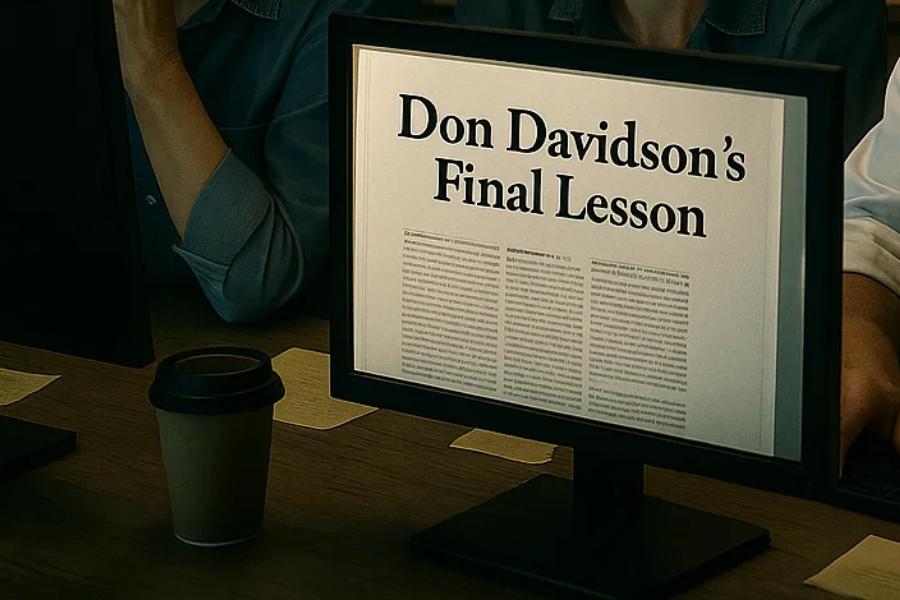
Each restaurant branch transformed into more than a place for fine dining. They added “Don Davidson Hours” every evening, where food was served freely to those in need.
Former critics returned to apologize. Reporters interviewed staff about the moment they realized who Don really was. Articles were published online. The story stirred something buried deep in society’s conscience.
Competitor chains even followed suit. Kindness, once seen as weakness, became a symbol of strength—and Don Davidson became the patron saint of second chances. But Carlos had not yet spoken.
The Long Walk
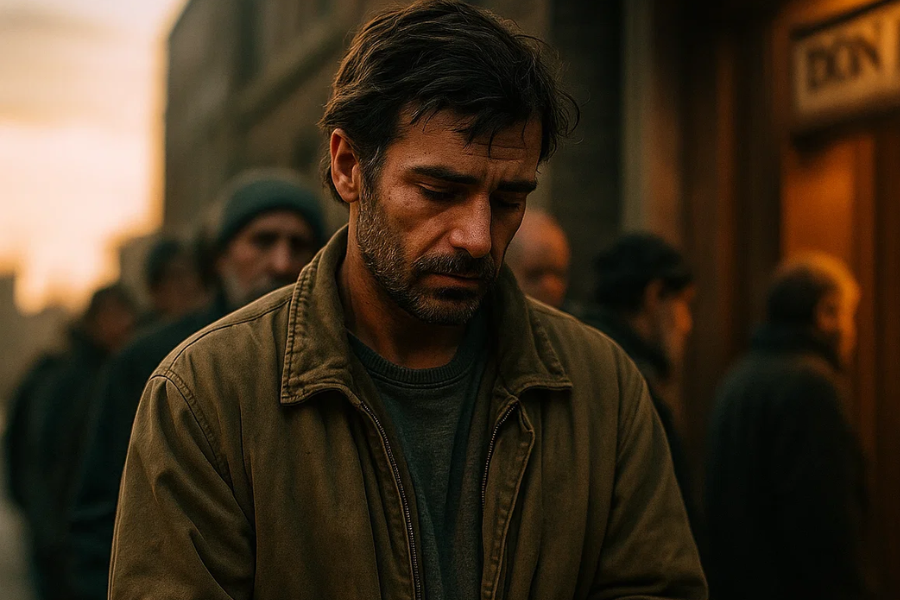
Carlos never returned to the kitchen that night. He vanished quietly, his pride crushed under the weight of guilt. Rumors said he left the city altogether.
Weeks passed. Then one morning, a tired man in a worn jacket appeared at the main branch. It was Carlos—older, humbled, and silent.
He waited in line with others seeking a free meal. When the manager recognized him, Carlos bowed his head and whispered, “I’m not here for food. I’m here for forgiveness.” Would they let him stay?
Forgiveness Served Warm
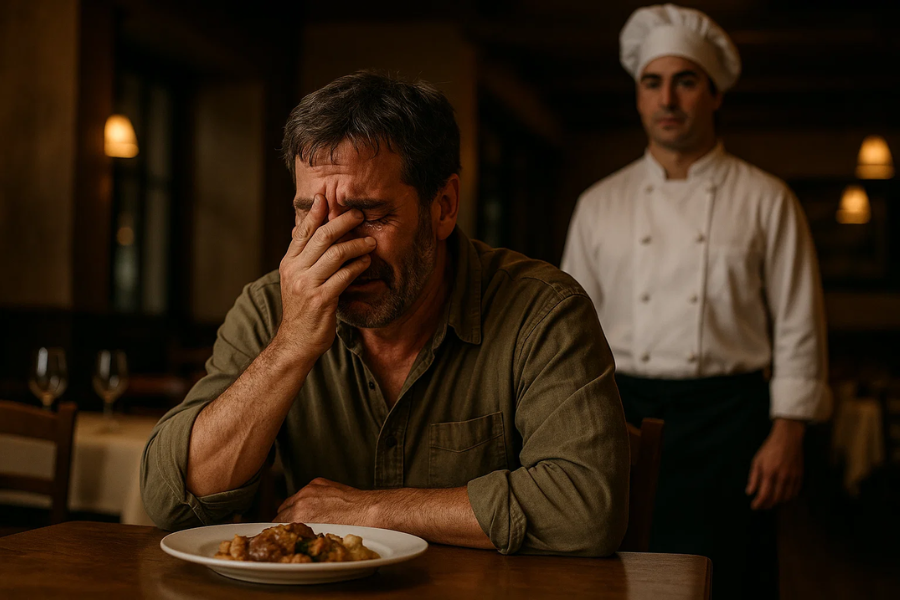
The new manager looked at Carlos for a long moment, then smiled gently. “Then come inside. We don’t serve pride here—we serve people.”
Carlos followed, wordless. The staff remembered how he once treated Don, but none turned him away. They set a plate before him.
And for the first time in years, Carlos didn’t bark orders or serve dishes—he simply sat and wept, letting the warmth of mercy feed his soul. One man’s legacy had changed another, and it will change more.
Beyond the Glass

Years passed. The restaurant chain expanded worldwide—but every new branch followed the same code: feed the hungry, listen to stories, treat strangers like old friends.
Don’s photo hung in every entrance, not posed in a suit, but captured candidly—smiling with an apron on, handing bread to a child.
Outside the glass, people still wandered hungry. But now, when they looked in, someone inside always noticed—and opened the door. And the restaurant launched its first project.
The Stranger’s Seat
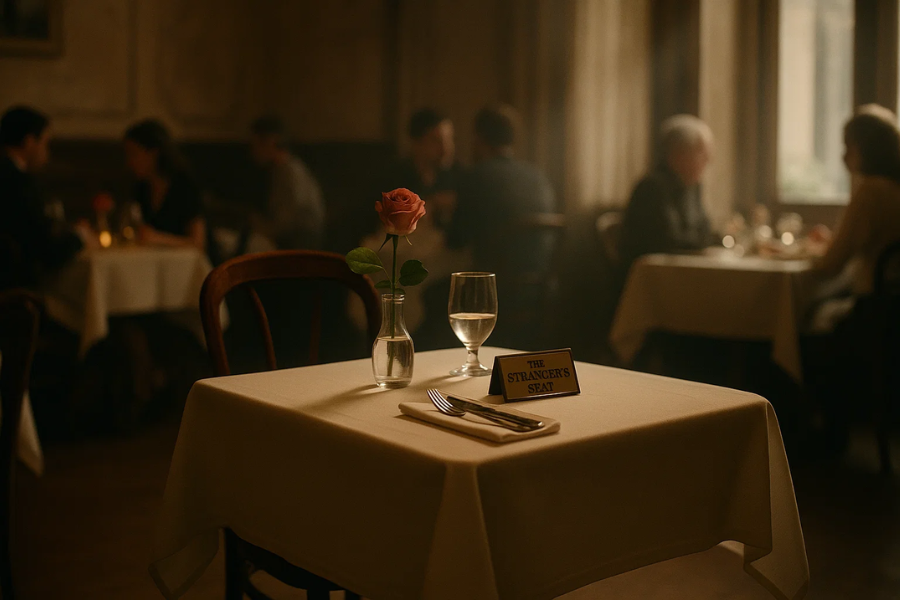
Each restaurant kept one seat open—never reserved, never closed. A single chair with a rose on the table meant for anyone who needed it most that day.
People from all walks of life sat there: a mother with nothing left, a boy without shoes, a teacher between paychecks. None left unnoticed or hungry.
They called it “The Stranger’s Seat,” though everyone eventually knew—it wasn’t really for strangers. It was for reminders. Of dignity. Of humanity. Of Don. And stories began to pour in.
Stories in Every City
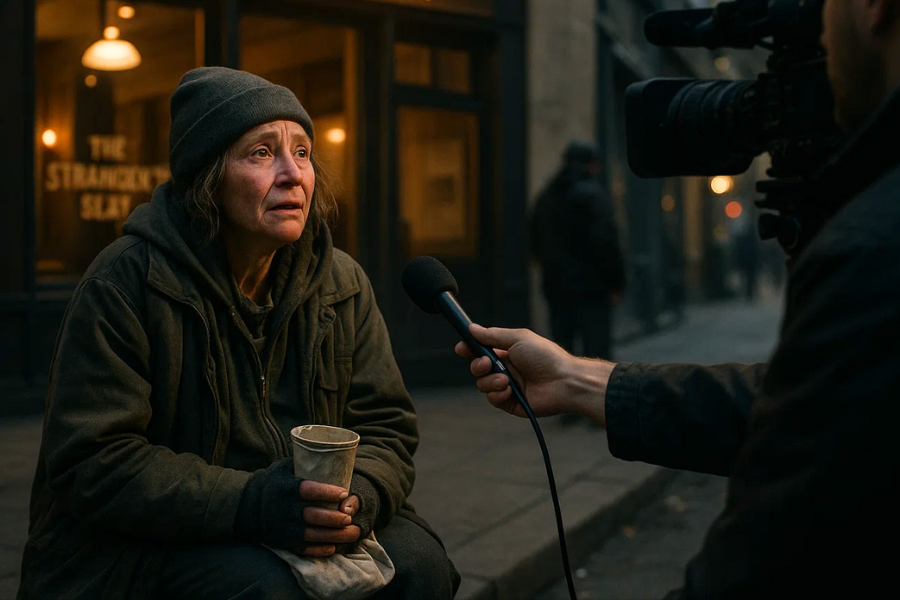
Bloggers wrote about the chain. Former skeptics turned loyal customers. A documentary crew traveled city to city capturing how one man’s test reshaped corporate kindness.
A retired nurse broke down after receiving a free meal. A child left a thank-you drawing, addressed simply: “To Mister Don.”
In every city, someone said: “This place saved me.” They didn’t mean the food. They meant the moment someone looked at them like they mattered. And one final message remained.
Be Kind, Always
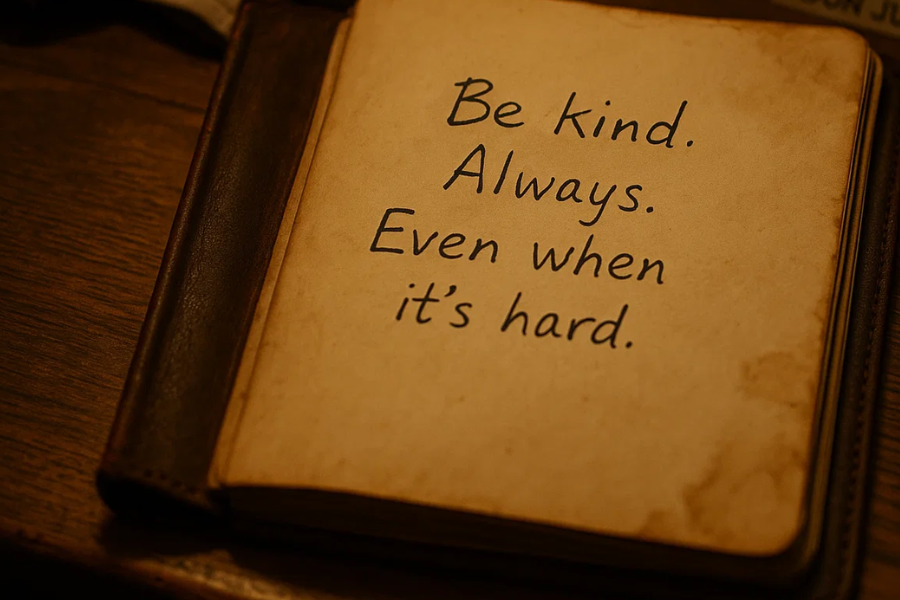
Inscribed on the final page of Don’s notebook were seven words, penned in shaking script just before he passed: “Be kind. Always. Even when it’s hard.”
His employees recited it like a mantra. Customers repeated it. Children carried it in lunchboxes. It became a motto stitched into aprons and hearts.
And as strangers opened doors for each other, offered seats, or simply smiled, somewhere in spirit, Don Davidson stood watching—his hunger long gone, his heart forever full. And someone else was about to follow in his footsteps.
The Young Boy Watching
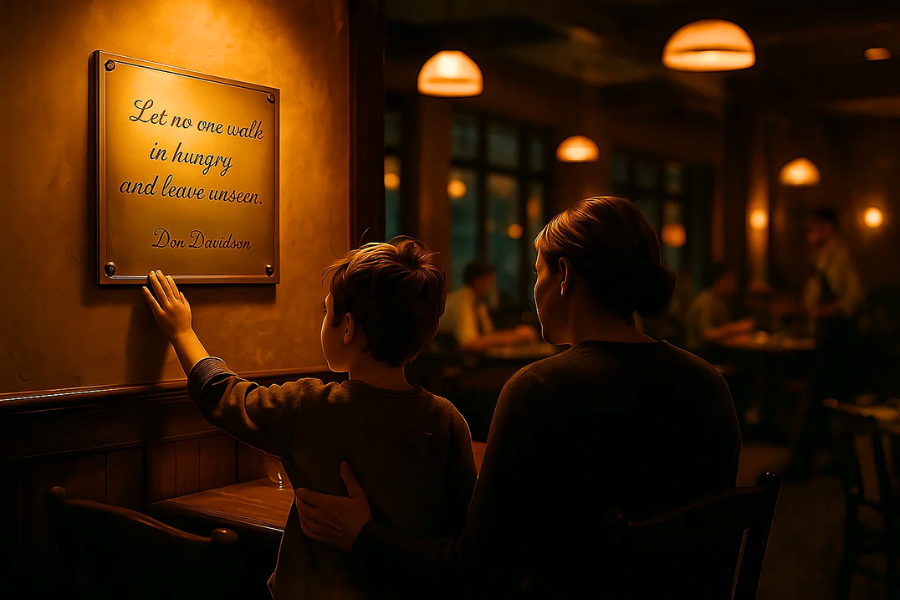
A small boy sat with his mother in one of the restaurants. They had no money, but someone had ushered them in, saying, “You’re exactly who we’re here for.”
He watched the servers work—not rushed, but joyful. He read the plaque on the wall, traced Don Davidson’s name with his fingers, and asked who he was.
When they told him the story, the boy whispered, “I want to be like him.” The mother cried quietly, holding him close. A seed was planted in a brand new heart.
The Fall of Carlos
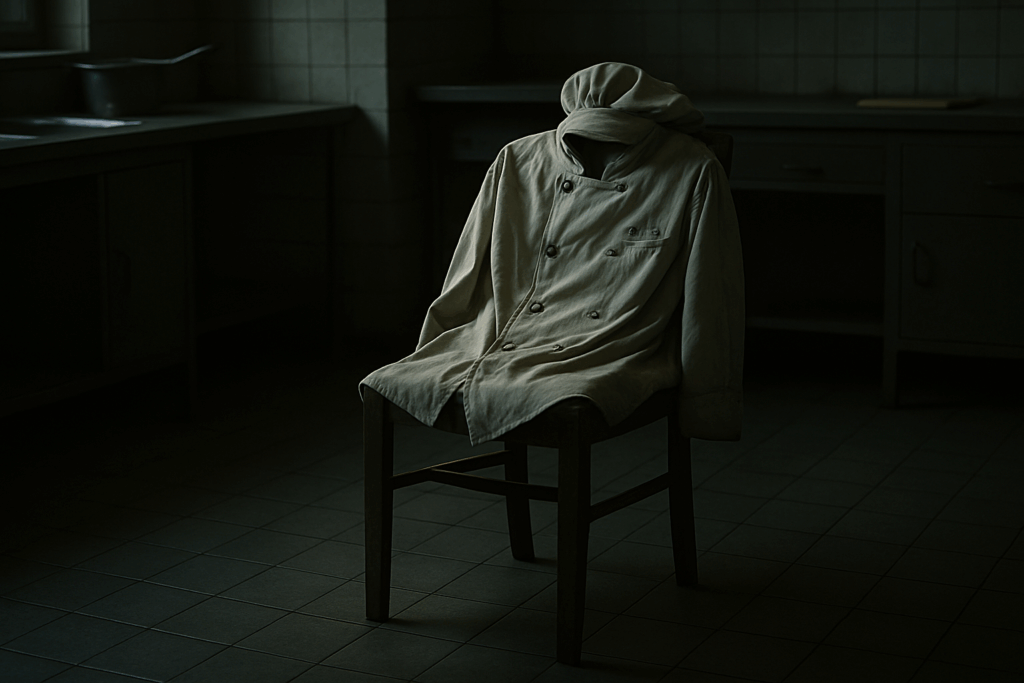
Carlos wasn’t just cruel—he was calculated. He wore loyalty as a mask while waiting to inherit a legacy he didn’t deserve. But greed always unmasks itself in time.
He taught us what power looks like without purpose. What happens when pride swells louder than conscience. And how quickly a kingdom collapses when built on ego.
In the end, Carlos didn’t just lose a fortune. He lost someone who once trusted him like a brother. And trust, once broken, doesn’t come back dressed the same.
The Rise of the Humble Manager
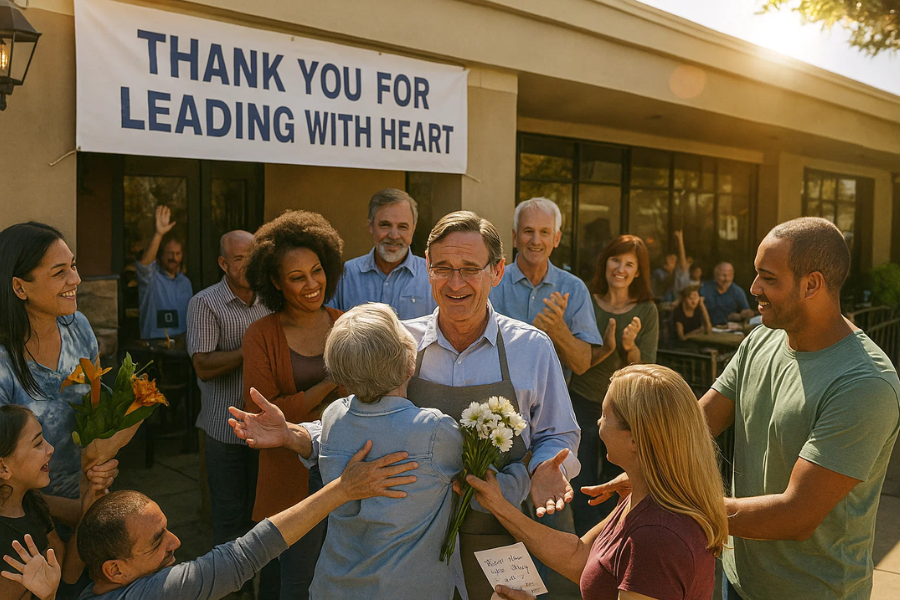
He had no title. No inheritance waiting. What he had was a past scarred by loss, and a heart still willing to believe in goodness—even when no one else was looking.
His kindness wasn’t performative. He didn’t know who Don was. He helped because he remembered what it felt like to be the one begging for grace.
In a world that applauds power, he proved that humility can still lead. That true leadership begins in the smallest choices—like setting a table for someone who has none. And that’s why Don chose him—not for his resume, but for his soul.
The Power of Perception
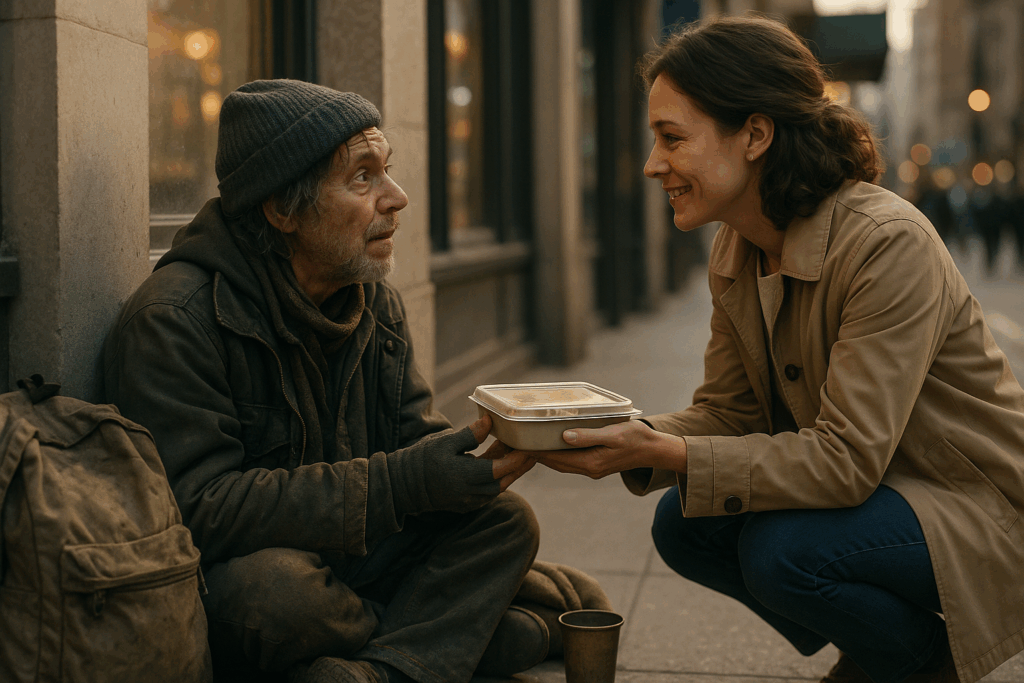
Don wasn’t just testing kindness—he was exposing the reflexes we hide. We judge fast. We rank worth by clothes, posture, and silence. And we often get it wrong.
The staff didn’t fail because they were evil. They failed because they stopped seeing. One glance and they dismissed a man whose shoes had walked farther than theirs.
What if we looked again? What if we questioned what we assume about others—especially the ones we’d rather ignore?
The Legacy We Leave
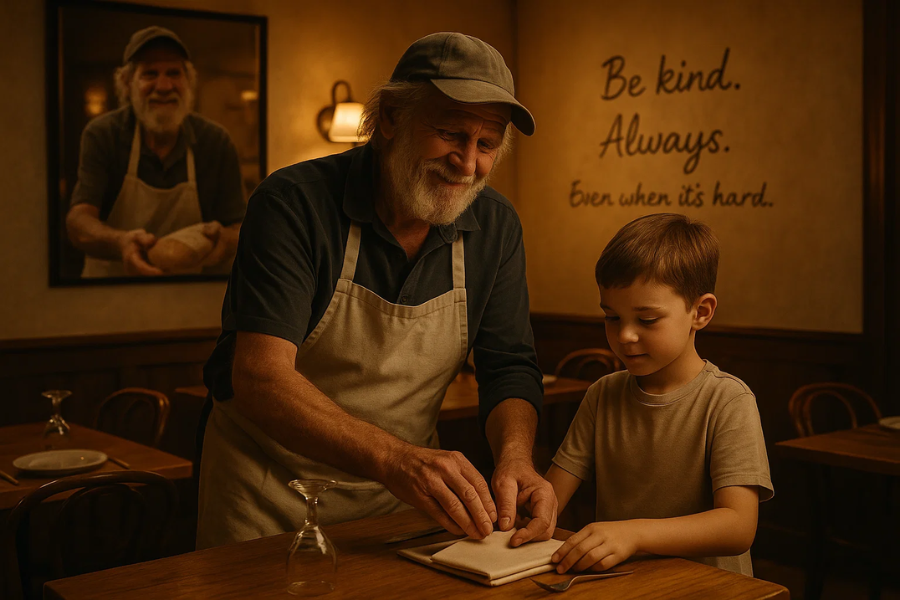
Don’s wealth didn’t lie in real estate or recipes—it lived in his values. He could’ve died with gold in his hands, but he chose to leave something heavier.
He gave away power to those who chose kindness without reward. He showed that leadership isn’t inherited—it’s revealed when no one’s watching.
And what he left behind wasn’t just a business. It was a blueprint for how to lead with heart. So what will you leave behind?
The Last Lesson
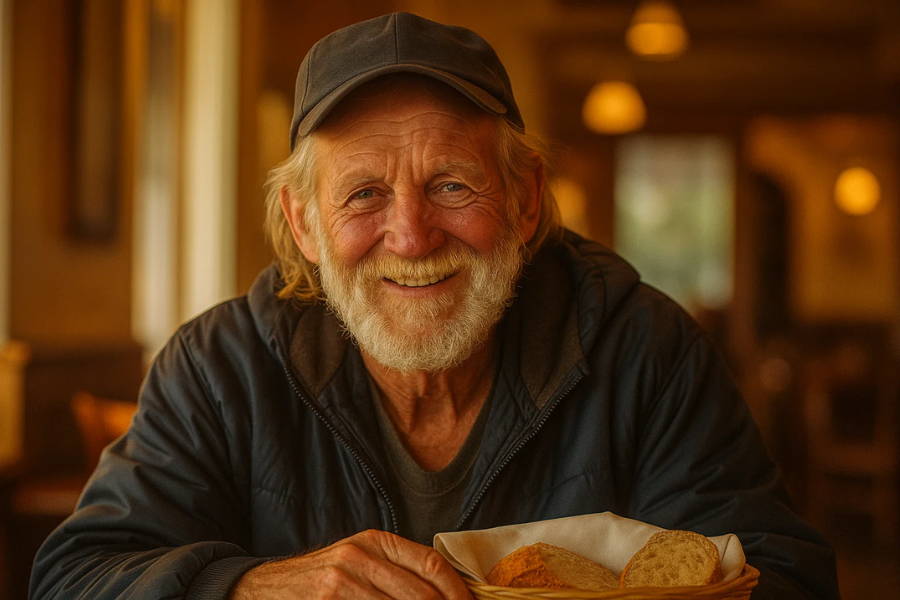
Every day, we pass people whose stories we’ll never know. Don Davidson knew that. He lived it, tested it, and left us all with one final truth:
We cannot choose what others carry, but we can choose how we respond. With cruelty—or with compassion. With silence—or with presence.
And when in doubt, offer bread. Open the door. Make space at the table. Because the next person you meet might just be the teacher you never expected. And you… could be their Don Davidson.
